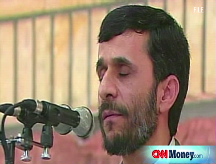Iran holds key to rebound
The health of the economy and markets will depend largely on what happens to oil prices. That means the situation in Middle East may trump everything else.
NEW YORK (CNNMoney.com) -- The biggest threat to the stock market and the economy may not be the housing market or more big losses from large banks. It's probably Iran.
Earlier this week, oil prices had begun to retreat and stocks had begun to move higher thanks in part to some calming words out of Iran.
But the news earlier this morning that Iran has test-launched nine ballistic missiles has oil prices inching higher and stocks heading lower again.
So how concerned should investors be?
Some energy experts have speculated that oil could hit $150 a barrel if tensions escalate between Iran and Israel. If the United States gets involved, that could even bring the price of crude up to $200, some say.
The big worry is that any disruption in oil production in the Middle East would trump the fact that a weakening global economy should lead to lower oil prices down the road.
"Demand is waning as the economy slows. But Iran launching missiles didn't help us," said Jeffrey Saut, chief investment strategist for Raymond James Financial.
Clearly, soaring oil prices have hurt the U.S. economy.
"These levels of oil prices are crushing for small businesses and consumers and it will show up in the next three months," said Kurt Karl, chief U.S. economist with Swiss Re.
"This latest Iran scare has been partially built into the market, and our best guess is that oil prices should be in the range of $135 to $150 for the rest of the year," he said. "But there's about a 10% to 15% chance oil could go to $200."
Karl predicts that if oil prices don't retreat soon, then over the next few months, the economy could start to shed 200,000 jobs a month, much higher than the average job loss of about 73,000 a month experienced so far this year.
A further spike in oil might also make it more difficult for the Federal Reserve to hold off on keeping interest rates as low as they are.
The Fed has signaled that it is watching inflation closely but in a speech by Federal Reserve chairman Ben Bernanke yesterday, Bernanke said that the Fed may extend its emergency-loan program to investment banks until next year.
That was interpreted as a sign that the Fed still thinks the worst of the credit crisis may not be over and that it is not willing to consider raising interest rates just yet, even if inflation pressures pick up.
But substantially higher oil, and the weaker dollar that would likely accompany it, could throw a monkey wrench in the Fed's plans. It's hard to imagine the Fed sitting tight for much longer if crude prices resume their record run.
So while it will be extremely important to keep an eye on corporate earnings over the next few weeks for an indication of how the economy is faring, it will be even more crucial to pay attention to Iran. If war is averted, investors and consumers will be able to breathe a huge sigh of relief.
"The market is spring-loaded for a rally but the catalyst will be a crack in the price of crude oil," Saut said.
Issue #1 - America's Money: All this week at noon ET, CNN explains how the weakening economy affects you. Full coverage.
Gas prices have climbed to record levels. Are you feeling the pinch? Tell us how gas prices are affecting you and what you're doing to cope. Send us your photos and videos, or email us and tell us what you think. ![]()



